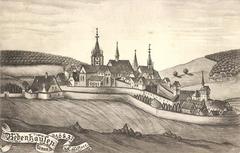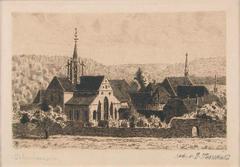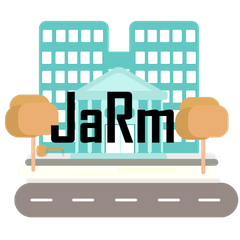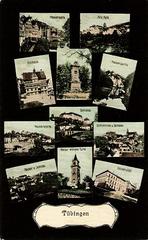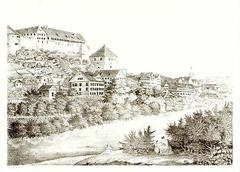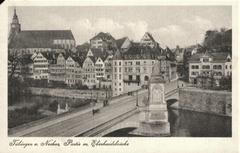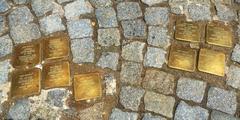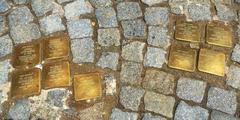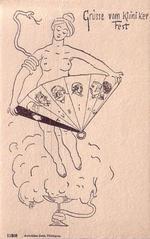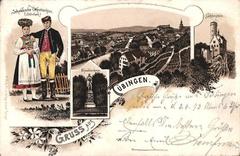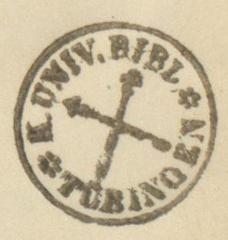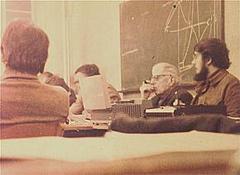Index Theologicus Visiting Hours, Tickets, and Guide to Tübingen Historical Sites
Date: 14/06/2025
Introduction to Index Theologicus and Its Significance in Tübingen
Nestled in the storied university town of Tübingen, Germany, the Index Theologicus (IxTheo) serves as an unparalleled digital gateway for global theological research and scholarship. Developed and maintained jointly by the University Library of Tübingen and its Evangelical and Catholic Theological Faculties, IxTheo has grown into the world’s largest freely accessible bibliographic database devoted to theology and religious studies. Rooted in the centuries-old tradition of the Eberhard Karls University—established in 1477—IxTheo masterfully unites academic heritage with contemporary digital innovation. It encompasses a vast range of Christian confessions and interreligious studies, offering millions of bibliographic records in multiple languages and formats.
This comprehensive guide delves into IxTheo’s origins, digital transformation, and its critical role in democratizing theological knowledge. It also provides practical information for those wishing to visit the University Library of Tübingen—IxTheo’s physical base—including visiting hours, access details, amenities, and research tips. Set within Tübingen’s rich cultural and academic landscape, this article covers travel advice, local attractions, accessibility, and visitor resources to ensure a rewarding experience.
Whether you are a scholar seeking advanced research tools, a student beginning theological studies, or a traveler intrigued by Tübingen’s academic legacy, this guide equips you to fully engage with IxTheo and its unique surroundings. For direct access and further information, visit the official Index Theologicus website and the University Library of Tübingen’s information portal.
Table of Contents
- Introduction to Index Theologicus and Its Significance in Tübingen
- Origins and Development of Index Theologicus
- Digital Transformation and Open Access Initiatives
- Scope and Content Coverage
- Institutional Collaboration and Editorial Oversight
- Technological Infrastructure and User Accessibility
- Using Index Theologicus: Research Tips
- Impact on Theological Research and Scholarship
- Recent Developments and Future Directions
- Visiting the University Library of Tübingen
- Index Theologicus Visiting Hours, Access, and Visitor Information
- Facilities and Amenities for Visitors
- Navigating the Index Theologicus Database
- On-Site Research Support and Events
- Frequently Asked Questions (FAQ)
- Tübingen: Historical and Cultural Context
- Practical Visitor Tips for Tübingen
- Visiting Hours, Tickets, and Accessibility for Tübingen’s Main Attractions
- Museums and Academic Sites
- University of Tübingen
- Dining, Shopping, and Local Life
- Day Trips and Surroundings
- Conclusion
- References and Further Reading
Origins and Development of Index Theologicus
The Index Theologicus (IxTheo) stems from the rich theological tradition of the Eberhard Karls University of Tübingen, founded in 1477. In response to the expanding diversity of theological scholarship, the University Library, together with its Protestant and Catholic Theological Faculties, launched IxTheo in the late 20th century as a centralized, international resource for cataloguing theological works.
From its beginnings as a print bibliography, IxTheo has evolved into a sophisticated digital platform, mirroring developments in academic publishing and information management (AKThB Database Overview).
Digital Transformation and Open Access Initiatives
A pivotal moment in IxTheo’s history was its transformation into a fully open-access, digital database, made possible through funding from the Deutsche Forschungsgemeinschaft (DFG). Since the early 21st century, the University Library has undertaken large-scale digitization projects, notably making retrospective article-level cataloguing possible.
By 2021, the digitization of over 68 theological journals—comprising about 4,000 volumes and 1.4 million pages—added approximately 160,000 articles and reviews to IxTheo, all freely available in full text. This initiative has made theological literature broadly accessible to a global audience (University of Tübingen News).
Scope and Content Coverage
IxTheo’s strengths include:
- Confessional breadth: Protestant, Catholic, Orthodox, and other Christian traditions, as well as interreligious and comparative studies.
- Multilingualism: Bibliographic records in numerous languages, reflecting global scholarship.
- Media diversity: Books, journal articles, reviews, essays, and digital publications.
- Time span: Both historical and current works, with ongoing retrospective digitization (AKThB Database Overview).
As of June 2025, IxTheo features millions of records, with continual updates and expansions.
Institutional Collaboration and Editorial Oversight
IxTheo is managed through collaboration between the University Library and both the Evangelical and Catholic Theological Faculties of Tübingen. Editorial oversight is provided by a team of expert scholars and librarians, upholding academic standards and curating content.
IxTheo also collaborates with other key databases such as the American Theological Library Association (ATLA) and the Virtueller Katalog Theologie und Kirche (VThK), enhancing interoperability and scholarly resource sharing (AKThB Database Overview).
Technological Infrastructure and User Accessibility
IxTheo is built on robust, open-source platforms like Open Journal Systems (OJS), which allows each digitized journal to have its own dedicated website and URL. The database offers powerful search functions, enabling filtering by author, subject, date, and language (University of Tübingen News).
The database is open to all, with no subscription or institutional barriers, supporting access for scholars, students, clergy, and the public worldwide.
Using Index Theologicus: Research Tips
- Searching: Utilize advanced search to combine keywords and filter by language, type, and date.
- Full-text access: Many entries provide direct links to full-text articles and digitized materials.
- Resource integration: IxTheo interfaces with external databases for deeper research.
- Support: Subject librarians at the University Library offer expert guidance.
Impact on Theological Research and Scholarship
IxTheo has revolutionized access to theological scholarship by aggregating a vast array of resources in one accessible platform. It supports the study of theological development, curriculum creation, and interfaith research by providing confessionally and linguistically inclusive content.
With its open-access model, IxTheo has fostered international collaboration and firmly integrated German theological research into global academia. According to Dr. Marianne Dörr, Director of the University Library, IxTheo is a foundational infrastructure for theological research worldwide (University of Tübingen News).
Recent Developments and Future Directions
The 2021–2024 DFG-funded digitization project expanded IxTheo’s holdings significantly, attracting both traditional and digital humanities scholars. Future plans include integrating multimedia and born-digital publications to further enhance access and user experience (University of Tübingen News).
Visiting the University Library of Tübingen
Although IxTheo is primarily digital, its operations are headquartered at the University Library of Tübingen (Geschwister-Scholl-Platz, 72074 Tübingen). The library offers guided tours, research assistance, and access to special theological collections. For up-to-date visiting hours, events, and exhibitions, consult the University Library’s website.
Appointments with subject librarians can be arranged for a deeper exploration of IxTheo and related resources.
Index Theologicus Visiting Hours, Access, and Visitor Information
- Library Address: Universitätsbibliothek Tübingen, Geschwister-Scholl-Platz, 72074 Tübingen, Germany
- Contact: +49 7071 29-0 or via contact form
- Opening Hours:
- Monday to Friday: 8:00 AM – 10:00 PM
- Saturday: 9:00 AM – 8:00 PM
- Sunday: 10:00 AM – 6:00 PM
Note: Hours may vary on holidays or during university events. Always verify via the official library website.
-
Digital Access: Worldwide, free, and unrestricted via IxTheo online portal.
-
On-site Access: Public welcome; borrowing requires a library card, with guest passes available for short-term use. International scholars should arrange access in advance if possible.
Facilities and Amenities for Visitors
- Quiet study and reading areas
- Computer workstations with IxTheo access
- Free Wi-Fi throughout the building
- Personal lockers
- On-site café and vending machines
- Full wheelchair accessibility, including elevators and accessible restrooms
Navigating the Index Theologicus Database
IxTheo offers a modern, intuitive interface in both German and English, including:
- Simple Search: Quick keyword, author, or title lookups
- Advanced Search: Filter by type, language, subject, and date
- Expert Mode: Boolean queries and multi-field cross-referencing
- Direct Full-Text Links: Where permitted, instant access to articles and books
For step-by-step help, see the IxTheo user guide PDF.
On-Site Research Support and Events
- Reference librarians with theological expertise
- Workshops and tutorials on maximizing IxTheo’s features
- Access to rare print collections and historical materials
- Regular academic events, lectures, and networking opportunities (library events calendar)
Frequently Asked Questions (FAQ)
Q: Is Index Theologicus free to use?
A: Yes, both online and on-site access are free. Some services (e.g., printing, borrowing) may incur fees.
Q: What materials does IxTheo include?
A: Bibliographic records for books, articles, reviews, essays, and digital publications in theology and religious studies.
Q: Is there an entry fee for the library?
A: No, entry and reading room use are free.
Q: Are guided tours offered?
A: Not regularly, but can be arranged in advance.
Q: Is the library accessible for visitors with disabilities?
A: Yes, with full wheelchair access and accessible facilities.
Q: Can I take photographs inside?
A: Generally not allowed in reading rooms; public areas may permit photography with permission.
Tips for a Successful Visit
- Some information is in German, but the IxTheo platform and most staff communications are bilingual.
- Use lockers for large bags.
- Maintain silence in study areas.
- Bring your own device or use available computers for digital research.
Nearby Amenities and Accommodation
Centrally located, the library is near historical sites, cafés (such as Café Hanseatica, Café im Hirsch, and Café Ranitzky (Loving Travel)), hotels, and guesthouses. The city’s public transport system offers easy access throughout Tübingen.
Safety and Library Etiquette
Tübingen is known for its safety and hospitality. In the library, observe standard etiquette: quiet conversation, careful handling of materials, no food or drink in reading areas, and respect staff instructions.
Tübingen: Historical and Cultural Context
Medieval Roots and Academic Prestige
Tübingen, in southwestern Germany’s Baden-Württemberg, boasts a history of over 900 years. Its medieval old town is renowned for its winding lanes and half-timbered houses (Eupedia). The founding of Eberhard Karls University in 1477 established Tübingen as a major academic center. The university and its theological faculties have produced Nobel laureates and been central to scientific and theological breakthroughs.
Theological Significance
Tübingen’s legacy in theology is embodied in the Index Theologicus (IxTheo), which provides global open-access to theological resources. The platform includes review journals and, where permitted, full-text access to scholarly works (NOBTS).
Practical Visitor Tips for Tübingen
Best Time to Visit
May to September offers the best weather (15°C–25°C) for sightseeing and events like the Stocherkahnrennen boat race. The ChocolArt Festival is held in early December (Eupedia).
Getting There and Around
Tübingen is an hour by train from Stuttgart. The city is walkable, with public parking and easy public transport. For excursions, plan transportation and tickets ahead (My Germany Vacation).
Accommodation
Options range from cozy Altstadt hotels to modern chains. Book early during festivals or university events (My Germany Vacation).
Visiting Hours, Tickets, and Accessibility for Tübingen’s Main Attractions
- Hohentübingen Castle: Tue–Sun, 10:00–17:00. ~€6/adult. Partial wheelchair accessibility.
- Museum WorldCultures: Tue–Sun, 10:00–17:00. Entry often included with castle ticket.
- Bebenhausen Monastery and Palace: Daily, 10:00–17:00. ~€5–€7/adult. Mostly accessible.
- Stiftskirche: Daily, 9:00–18:00. Free entry, donations welcome. Wheelchair accessible.
- Neckarfront & Hölderlinturm: Open access; riverside walks and boat rides.
- Platanenallee & Neckarinsel: Open at all times for walks and picnics.
Museums and Academic Sites
- Bohnenberger Observatory: By appointment or during events.
- Stadtmuseum Tübingen: Tue–Sun, 10:00–17:00; ~€4 admission.
- Kunsthalle Tübingen: Hours vary by exhibition.
University of Tübingen
Historic university buildings such as the Alte Aula and Burse are open during university hours. Guided tours can be arranged (Eupedia).
Dining, Shopping, and Local Life
Wilhelmstraße and the Altstadt offer vibrant cafés, restaurants, boutiques, and bookstores like Heckenhauer (My Germany Vacation).
Day Trips and Surroundings
- Bebenhausen Monastery & Palace
- Castle Hohenzollern
- Castle Lichtenstein
- Bad Urach (spa town and hiking)
All are accessible by car or public transport; advance planning is recommended (My Germany Vacation).
FAQ: Tübingen Visitor Information
Q: What are the usual opening hours for major attractions?
A: Typically 10:00–17:00, Tuesday–Sunday. Check individual sites for updates.
Q: How much are tickets for Hohentübingen Castle?
A: About €6 for adults, with discounts available.
Q: Are guided tours offered?
A: Yes, often by prior arrangement.
Q: Is Tübingen accessible for those with mobility challenges?
A: Many sites offer accessibility, but historic areas may have uneven terrain.
Q: How do I get around?
A: The city is walkable, with good public transport and parking.
Summary and Final Tips
Index Theologicus stands as a beacon of theological scholarship, merging Tübingen’s academic heritage with modern digital accessibility. The University Library’s dedication to open access, expert curation, and ongoing innovation ensures IxTheo’s continued relevance and utility for the global theological community.
Visitors to the University Library can enjoy modern facilities, research support, and the opportunity to explore unique theological collections. Coupled with Tübingen’s rich history, museums, and vibrant student life, a visit offers both scholarly enrichment and cultural immersion.
For the latest information, consult the University Library of Tübingen and explore IxTheo’s online portal.
References and Further Reading
- Index Theologicus: Comprehensive Access to Theological Research from the University of Tübingen, 2025, University of Tübingen (University of Tübingen News)
- Index Theologicus Visiting Hours, Access, and Research Guide at University of Tübingen, 2025, University Library of Tübingen (University Library Information)
- Tübingen Visiting Hours, Tickets, and Top Historical Sites Guide, 2025, Eupedia (Eupedia Tübingen Guide)
- Tübingen Visiting Hours, Tickets, and Top Historical Sites Guide, 2025, My Germany Vacation (My Germany Vacation)
Alt text: University Library of Tübingen, home of Index Theologicus
Alt text: Screenshot of the IxTheo advanced search interface
